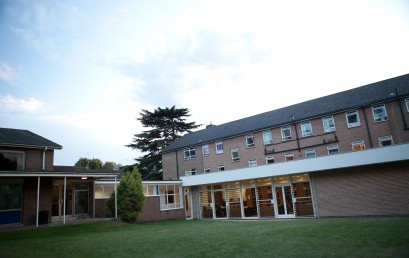This post will be the last set of recommendations for those whom one might call “beginning students.” I had said that I would do Church history and biography, but first let me say something about the apologists Francis Schaeffer and C. S. Lewis. Surveying some of the works of these men does not mean that I endorse everything about their methodology or substance, but the importance of their work speaks for itself.
Francis Schaeffer wrote small but thoughtful books about worldview. His style requires a little effort to adapt to, but his concerns are of great relevance today. The first works by him that you should seek out are those which comprise what is known as The Trilogy. Those are, The God Who Is There, Escape From Reason, and He Is There and He Is Not Silent. They can now be purchased in a single volume. These books deal with the consequences of abandoning Truth and Reason, and the reality of God. Yes, you’ll have to put your thinking caps on.
Also important by Schaeffer are his Death in the City, True Spirituality, and The Church at the End of the Twentieth Century. Finally, his How Should We Then Live? is a sweep through history with a diagnosis of Western despair. I’m not saying you have to read all these titles, but do try and read some of them.
C. S. Lewis was a man of great erudition but with a working man’s outlook. Of his fiction works, everyone should read (or listen to) his Chronicles of Narnia. As well as being rattling good stories they explore Christian themes such as temptation, folly and its consequences, the virtues, sacrifice, redemption, the struggle to do the good, and hope. After that I recommend the deeper, more “philosophical” yet still entertaining “Space Trilogy” (or “Ransom Trilogy”). These are remarkable reflections on the fallenness of our world, on providence and the reality of the spirit world. Lewis displays the arrogance and folly of intellectuals brilliantly; something we need to put our fingers on today.
Two more fictionalized accounts from his pen are The Great Divorce; an imaginary bus trip from “Hell” to the border of “Heaven.” The depictions of slavery to sin, and of the half-light in which we live when contrasted with Heaven are memorable. The second is The Screwtape Letters, which is profound yet delightful set of correspondence between an older demon to his apprentice regarding keeping a man from seeing truth, from dwelling on reality, and from trusting “the Enemy.”
Other non-fiction books by Lewis are Mere Christianity, and Miracles. Lewis is a thinker of the first order and his works need to be reread regularly.
Church History
Church History as History generally, seems to have suffered in our perverse and narcissistic times. It is essential that Christians have some grasp of their heritage. It links them with those who have now gone to their reward. In this regard I think the following books are most helpful:
Sketches From Church History by S. M. Houghton, and The Pilgrim Church by E. H. Broadbent. Of American authors see Bruce Shelley’s Church History in Plain Language, and Earl Cairns’ Christianity Through the Centuries.
A few books highly recommended to go with the above are J. C. Ryle’s Five English Reformers and Christian Leaders of the Eighteenth Century. Both are superb. S. M. Houghton edited the book Five Pioneer Missionaries which is very good. Then there is Leland Ryken’s study of Puritanism called Worldly Saints which is worth a mention, as is the similar volume by Peter Lewis called The Genius of Puritanism. But I’m pushing it a bit by including those titles as they’re a little tougher to get through.
Biographies
There are countless biographies of notable men and women of the Church. Some of them are maudlin encomiums of a revered individual, few are warts and all portrayals. Here are some suggestions:
Here I Stand by Roland Bainton is still the classic biography of Luther, although I also like Herman Selderhuis’s Martin Luther – A Spiritual Biography.
Since I referred to warts and all I am reminded to include Lady Antonia Fraser’s terrific biography of Oliver Cromwell: The Lord Protector (in England its title is Cromwell: Our Chief of Men after Milton’s description).
We have to have a biography of Spurgeon, and Arnold Dallimore’s Spurgeon: A New Biography fits the bill admirably. Anything by Dallimore is worth reading. If you can get it I advise reading H. C. G. Moule’s brilliant biography of Charles Simeon. Then there is the Memoir and Remains of Robert Murray M’Cheyne by A. A. Bonar. Most of the biographies of John Pollock (Whitefield, Cambridge Seven, Hudson Taylor) are very good. Much the same holds for Kevin Belmonte (Wilberforce, Chesterton, Moody), although I can’t recommend all his stuff.
There are several good biographies of C. S. Lewis by Roger Lancelyn Green, George Sayer, and Alan Jacobs.
I close with Christopher Catherwood’s fine Martyn Lloyd-Jones: A Family Portrait. I know there are many volumes I could and probably should have included, but I must end somewhere. I shall pick things up when I do the list for “Advanced” readers.


3 comments On A “Must-Read” Booklist For Those Who Want To Study Theology (3)
Pingback: A “Must-Read” Booklist For Those Who Want To Study Theology (3) | Talmidimblogging ()
What is the difference between the 3rd and 4th edition of Shelly’s church history books besides the 20 dollar difference for a Kindle version? Is the content that different? Were some of his statements erroneous needing to be changed? I would like your thoughts before I choose.
You know Steve, I haven’t checked. Here’s my rule (FWIW): The second edition of a book is usually worth getting, but check what emendations have been made. Unless significant changes have been made thereafter, don’t bother.